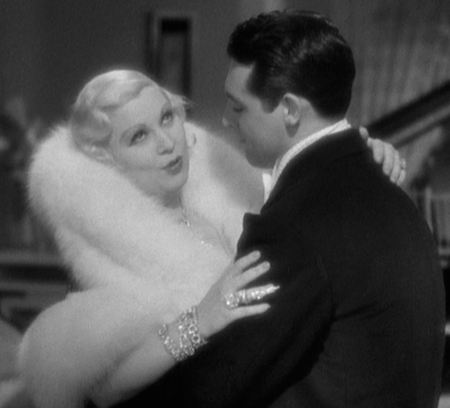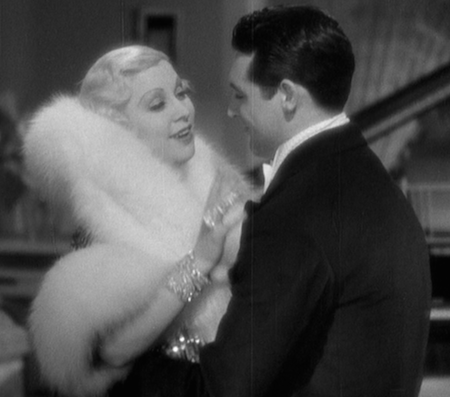
When the Flapper Dame announced the 2nd annual Classic Quotes Blogathon, naturally I thought of Mae West, she of the long list of enduring one-liners from film.
It’s difficult to pick the most iconic of West’s lines, so I won’t try. But certainly, one of the most beloved is this: “…when I’m good, I’ve very good, but when I’m bad, I’m better.”
The line is funny enough on its own, even without West’s terrific delivery. But it’s even funnier in the scene with Cary Grant from I’m No Angel (1933), when the two lovers are describing her performance as a lion tamer in a circus, but obviously addressing a very different kind of performance entirely:
“Ahh, you were wonderful tonight,” he begins, the two in each other’s clutches.
“Mmmm. I’m always wonderful at night.” (This is so typical of West: a hilarious line before an even funnier, more memorable one. A kind of one-two punch of her humor that never gets old.)
“Yes, but tonight you were especially good.”
“Well, when I’m good, I’ve very good, but when I’m bad (a pat on the shoulder for emphasis), I’m better.”
You can see it here (though why you don’t already own this marvelous film, I have no idea.)
What’s interesting to me is what’s left out of the oft-repeated line. The long-drawn out “well” drawl, after all, is so typical of West’s reactions to men’s compliments, and just as suggestive of sex as the line itself. The thing is, you need West’s delivery to pull it off, which is why I assume most drop it when the quote is referenced.
And referenced it is. A Google search on the line brings up a host of surprising appearances. Just check out the tepid “When I’m Bad” by Chumbawamba for an odd one, a perfect example of how much sexier a line could be almost a 100 years ago than it is now.
If you’ve seen West’s films before, you’re familiar with her sexually confident heroines, who are at ease expressing lines like this one. West’s heroines were in their late 30s or early 40s with a string of younger lovers. Their most noticeable traits, besides a ridiculous amount of sensuality, is their lack of shame about who they are: their scandalous embrace of sex, their working-class careers, their honesty in the face of others who want to belittle or condescend to them. They are bold, feminist, triumphant, so much fun. Simon Louvish’s Mae West: “It Ain’t No Sin,” begins with a curious list of West’s never-will-dos. Number 7 on the list is particularly interesting to fans of her films:
“Play mother parts, sad parts, dumb parts, or a virtuous wife, betrayed or otherwise. I pity weak women, good or bad, but I can’t like them. A woman should be strong either in her goodness or badness.”
Sounds like her famous line, doesn’t it? Certainly, the way she relished and laughed at sex made West famous. But it’s her strength that keeps me enamored, the strength to write and perform such lines, to own her sexuality with such joy. It’s not surprising that she refused to play roles that she found unrepresentative of who she was. And I think that’s why this “When I’m good…When I’m bad…” line is so justly famous, so justly remembered. It’s not only that Tira (West’s character in the film) likes having sex with many men–in spite of society’s strong objections to her behavior–but that she owns it. We all reacted with shock when Samantha Jones did the same in Sex and the City, 65 years later. But both times, our reaction was the same: We were impressed. We wished we could be half that confident, particularly in the face of others’ disapproval.
In the scene, my favorite movement is West’s double pat of Grant. It’s a drumroll of a gesture before the final beat of the line, that perfect setup for the end. It’s almost chummy, that pat, and the expression that accompanies it is so funny. The move is almost–I have to say it–instructional. Hey, honey, in case you missed it. Lest we have any doubt about which one of them is in control here, that pat sets us straight.

For more on the movie, I’ve written about my favorite scene. For more on West’s pioneering career and unmatchable writing style, see the posts in my series on her. But what you really should do is stop reading and start watching. And turn to the Flapper Dame’s blogathon, where you can find a slew of fun entries on other iconic lines from classic film. Enjoy!

OH How I wish we could all find men like Cary to us this quote on- I haven’t but if you do let me know! Haha!!!! I think this line is still so suggestive and its truly timeless but absolutely no one does it better than Miss West!! Thanks so much for participating! See you round the blogging community! Emily!
Haha!!!! I think this line is still so suggestive and its truly timeless but absolutely no one does it better than Miss West!! Thanks so much for participating! See you round the blogging community! Emily!
Thanks, Emily! I’m enjoying your blogathon so much. I don’t think there are many like him–probably one of the reasons it’s fun to watch:)
I really found your insight into the line to be quite interesting and very true! I haven’t watched this film for a long time, but I think I would love it even more on a rewatch
Thank you! Oh, you would. This one really benefits from re-watches! How can you catch a quarter of the good lines in a first viewing?
Exactly!
Mae was the queen of the one liners! I would be honored if you would submit this to this week’s The Classic Movie Marathon link party http://classicmovietreasures.com/the-classic-movie-marathon-link-party-3/
Thank you Elaine! I’ll check it out. That sounds great.
Hope to see you again next week
Thanks, Elaine!
Great post! I enjoyed this line a lot when I saw I’m No Angel. I was almost too impressed with extra-yound Cary Grant, but I was paying attention enough to hear Mae West.
By the way, I’d like to talk to you more about Mae West being a feminist icon… Woul you be interested in writing a post about it for a publication?
Thanks for the kind comment!
Kisses!
Le
Hi Le,
Thank you. That sounds intriguing. I’d love to hear more: leah@carygrantwonteatyou.com
Just sent the proposition. Maybe it’ll be at the spam box, but I hope not!
Le
I’m not sure if my library has this or not. West has some classic lines, in movies, the most notable one in my book being inviting Cary Grant to come up and see here (in her room), in “She Done Him Wrong”. Nice review
If not, the Glamour Collection includes it and some other gems:) Yes, that’s one of my favorites too. Thank you!
You know, I do not own this film. And – don’t scream – I haven’t even SEEN this film. However, the way you wrote this review was very amusing, much like Ms West herself.
When I (finally) see this film, we’ll have to compare notes!
LOL. Thank you. I appreciate any comparison to her, however great the contrast! But I don’t know why you’d deprive yourself like that. It’s such a joy to watch it. Get it for a bad day, and see if Mae doesn’t turn your mood around for you:)